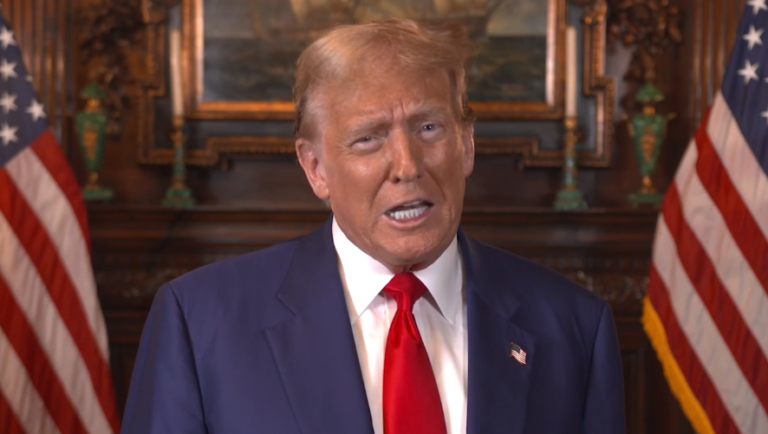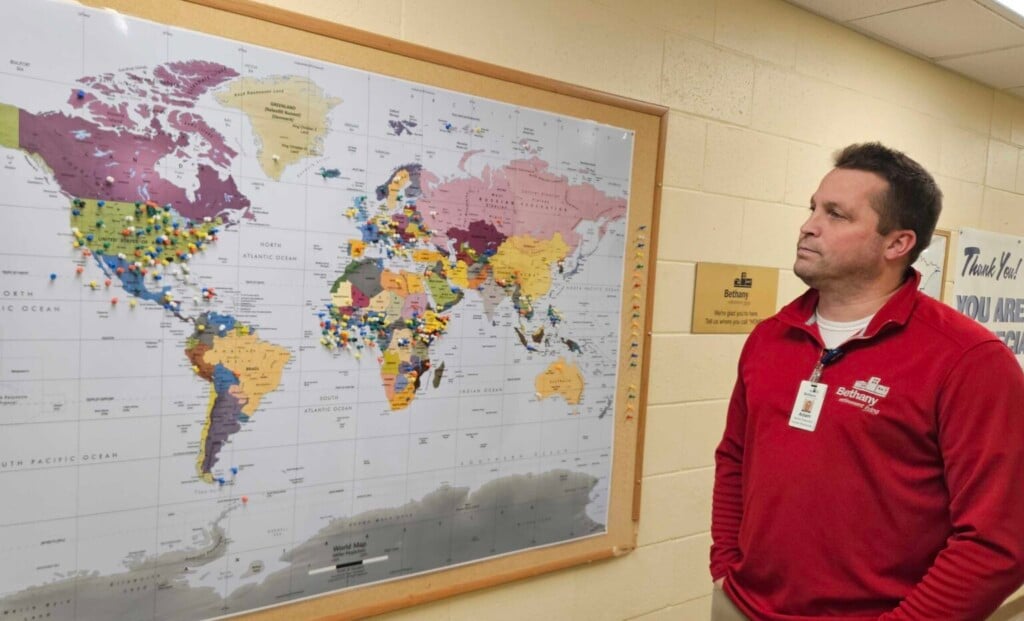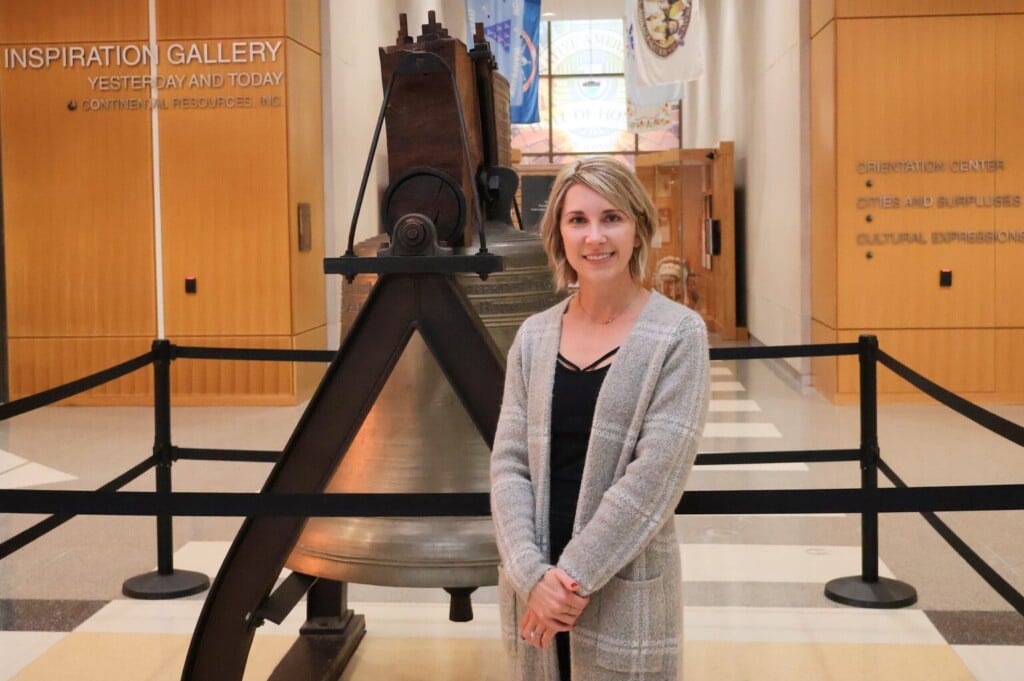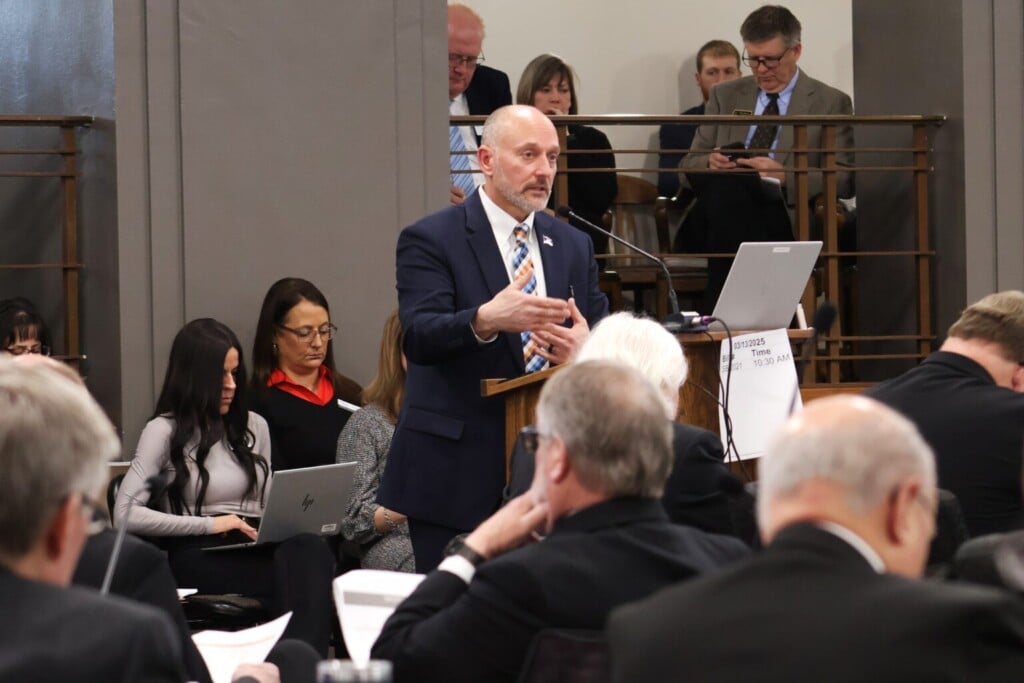UPDATE: Federal judge temporarily blocks Trump administration freeze on federal grants and loans

WASHINGTON (AP) — A federal judge on Tuesday temporarily blocked a push from President Donald Trump to pause federal funding while his administration conducts an across-the-board ideological review to uproot progressive initiatives.
The Trump administration plan plunged the U.S. government — and states and organizations that rely on federal funding — into panic and confusion and set the stage for a constitutional clash over control of taxpayer money.
The order from U.S. District Judge Loren L. AliKhan came minutes before the funding freeze was scheduled to go into effect on Tuesday afternoon. The administrative stay, prompted by a lawsuit brought by nonprofit groups that receive federal funds, lasts until Monday afternoon and applies only to existing programs.
Administration officials said the decision to halt loans and grants — a financial lifeline for local governments, schools and nonprofits — was necessary to ensure that spending complies with Trump’s recent blitz of executive orders. The Republican president wants to increase fossil fuel production, remove protections for transgender people and end diversity, equity and inclusion efforts.
But a vaguely worded memo issued by the Office of Management and Budget, combined with incomplete answers from the White House throughout the day, left lawmakers, public officials and average Americans struggling to figure out what programs would be affected by the pause. Even temporary interruptions in funding could cause layoffs or delays in public services.
“This sort of came out of the blue,” said David Smith, a spokesperson for the Shawnee Mission School District in Kansas, one of countless districts that receive federal funding. Now they’re trying to figure out what it means “based on zero information.
Democrats have described the Trump administration’s decision as capricious and illegal. They argued that the president had no right to unilaterally stop spending money appropriated by Congress.”
Just minutes after AliKhan ruled, Democratic attorneys general from 22 states and the District of Columbia filed their own lawsuit seeking to block and permanently prevent the administration from cutting off federal funding.
“There is no question this policy is reckless, dangerous, illegal and unconstitutional,” New York Attorney General Letitia James said.
AliKhan, who was appointed by President Joe Biden, said in halting the spending freeze, “It seems like the federal government currently doesn’t actually know the full extent of the programs that are going to be subject to the pause.”
Jessica Morton, an attorney for the National Council of Nonprofits which brought the suit, said the group has tens of thousands of members around the country that could be affected.
“Our client members have reported being extremely concerned about having to shutter if there’s even a brief pause,” Morton said.
Justice Department attorney Daniel Schwei said the plaintiffs hadn’t identified anyone specifically who would lose funding right away if the pause does go into effect. The White House did not immediately comment on the court-imposed stay.
Trump administration officials said programs that provide direct assistance to Americans would not be affected, such as Medicare, Social Security, student loans and food stamps. They also defended the funding pause, saying Trump was following through on his promise to turn Washington upside down if elected to a second term.
White House press secretary Karoline Leavitt on Tuesday initially would not say Medicaid was exempted from the freeze, but the administration later clarified that it was.
The effects of the order were being felt far from the nation’s capital. Organizations like Meals on Wheels, which receives federal money to deliver food to the elderly, were worried about getting cut off.
“The lack of clarity and uncertainty right now is creating chaos,” spokeswoman Jenny Young said. She added that “seniors may panic not knowing where their next meals will come from.”
The National Science Foundation postponed this week’s panels for reviewing grant applications. Officials in Prichard, Alabama, feared they wouldn’t receive infrastructure funding to fix their leaking drinking water system. Republican leaders in Louisiana said they were “seeking clarity” to ensure nothing was “jeopardizing financial stability of the state.”
“Trump’s actions would wreak havoc in red and blue communities everywhere,” said Sen. Patty Murray of Washington, the top Democrat on the Senate Appropriations Committee. “We are talking about our small towns, our cities, our school districts.”
The full scope of the administration’s review was spelled out in a 51-page spreadsheet sent to federal agencies and viewed by The Associated Press. Each line was a different government initiative, from pool safety to tribal workforce development to special education.
Officials were directed to answer a series of yes or no questions for every item on the list, including “does this program promote gender ideology?” or “does this program promote or support in any way abortion?” Responses are due by Feb. 7.
Trillions of dollars are potentially under review. Grants that have been awarded but not spent are also supposed to be halted if they might violate one of Trump’s executive orders.
WASHINGTON, D.C. (AP) — The White House is pausing federal grants and loans starting on Tuesday as President Donald Trump’s administration begins an across-the-board ideological review of its spending.
“The lack of clarity and uncertainty right now is creating chaos for local Meals on Wheels providers not knowing whether they’re going to be reimbursed for meals served today, tomorrow, who knows how long this could go on,” spokeswoman Jenny Young wrote in an email. “Which unfortunately means seniors may panic not knowing where their next meals will come from.”
The main funding for Meals on Wheels, which feeds more than 2 million seniors annually, and other senior nutrition programs is a grant distributed by the federal Administration on Aging to state governments that then send the money to individual providers.
“We need clarity now,” Young added.
Spokespeople for South Carolina, Maine and Washington’s agencies said they’re still trying to determine how the federal document will affect them, including their funding.
Maine Gov. Janet Mills said in a statement that she was “deeply concerned” by the directive, which she added is “causing entirely needless chaos and confusion across Maine and the nation that will turn into real and serious harm if it continues.”
But they acknowledged it was a test of his power over Congressionally-approved programs and could affect their states.
Many GOP senators emphasized that the freeze was so far temporary and that they were trying to find out more about how far it would reach. Others said it was the right move.
“It makes sense to me,” said Sen. Jim Banks, a Republican from Indiana.
Still, some cautioned that backlash could grow if the freeze is prolonged or if it affects programs like disaster aid.
Sen. Thom Tillis, a Republican whose state of North Carolina is recovering from tropical storms, said, “I can’t imagine that the president would knowingly cut off housing assistance for people displaced from their homes so we’ve just got to sort through it and see how they ultimately implement it.”
During her first media briefing Tuesday, White House press secretary Karoline Leavitt said the administration was opening up seats beside her podium, which had traditionally been occupied by administration staff, to “new media voices.”
Two of those seats were occupied Tuesday by Axios and Breitbart, a conservative news outlet.
Other traditional assigned seating in the room wasn’t changed.
Leavitt said more Americans are getting their news from nontraditional new sources, rather than legacy outlets who already have briefing room seats.
“I take great pride in opening up this room to new media voices,” she said.
She began by going through the recent arrests of unauthorized immigrants.
Dressed in a magenta pantsuit with a cross necklace, Leavitt went on Tuesday through the administration’s actions since Trump returned to the presidency last week. She said reporters have “access to the most transparent and accessible president in American history.”
Leavitt said the White House will talk much more broadly to new media outlets and will accept applications from podcasters and social media influencers to be in the briefing room. Leavitt also said people who lost their White House press passes during Joe Biden’s presidency will have their access returned.
The first question went to Mike Allen of Axios.
This will make Netanyahu the first foreign leader to visit Washington in Trump’s second term.
The visit comes as the United States is pressuring Israel and Hamas to continue a ceasefire that has paused a devastating 15-month war in Gaza.
Acosta announced his departure Tuesday at the end of his one-hour morning show on the network, telling viewers: “Don’t give in to the lies. Don’t give in to the fear.”
He didn’t specifically tie those sentiments to President Trump, but the implication was clear. CNN says its decision to move Acosta out of the daylight and into a time slot to begin at midnight Eastern time had nothing to do with politics.
Less than a half hour before Acosta’s announcement, Trump posted on social media that rumors that the anchor was leaving were good news. “Jim is a major loser who will fail no matter where he ends up,” Trump said on Truth Social.
CNN announced last week — Trump’s first week back in office — that it was shuffling its daytime lineup to move Wolf Blitzer into Acosta’s 10 a.m. ET time slot, paired with Pamela Brown. The network said it had offered Acosta a job at midnight and would move him to Los Angeles, where his show would air at 9 p.m., and also simulcast the program on CNN International.
But Acosta, who has been at CNN for 18 years, said Tuesday he had turned that down.
? Read more about Jim Acosta’s departure from CNN
It gives him a key role in helping President Donald Trump cut regulations and fix the nation’s infrastructure.
The former Wisconsin congressman has promised safer Boeing planes, less regulation and help for U.S. companies developing self-driving cars — while not giving any breaks to Elon Musk, a key player in that technology.
Duffy, a 53-year-old former reality TV star, was approved with bipartisan support on a 77-22 vote in the Senate.
He takes over the Department of Transportation at a crucial time at the agency, a massive employer of more than 55,000 that spends tens of billions of dollars annually, oversees the nation’s highways, railroads and airspace and sets safety standards for trains, cars and trucks.
? Read more about Sean Duffy
As of midday Tuesday, West Virginia Republican Gov. Patrick Morrisey said he didn’t yet have much insight into how the White House freeze on federal grants and loans would affect the state or its residents. Almost half of the state’s annual budget is made up of federal funds.
“What we’re going to do is we’re going to try to unpack that and talk with the Trump administration about that,” he said.
He then on to say “President Trump is going to be an amazing president.”
“Look, I do think what President Trump is trying to do generally is correct,” he said. “The federal government and quite frankly, the state government, has operated way beyond its means. Right? So you finally have leadership in Washington, you have leadership here in Charleston. I’m going to work just like President Trump to tackle the issues and be transparent.”
Medicaid is notably not exempt from a White House directive to pause all federal grants and loans by the end of day Tuesday. Medicare and Social Security, however, were spared in the memo.
The U.S. Health and Human Services agency doles out over a half trillion dollars to states in a joint partnership to run Medicaid, the nation’s health care coverage for about 80 million of the poorest of Americans, including millions of children.
A spokesman for Illinois Democratic Gov. J.B. Pritzker’s office said the state’s agencies have reported issues accessing the website used to request disbursement for Medicaid payments.
HHS did not immediately respond to questions about the spending freeze and whether Medicaid payments would continue.
That’s because the Justice Department appears poised to take a very different approach to investigating voting and elections.
Conservative calls to overhaul the department by removing career employees, increasing federal voter fraud cases and investigating the 2020 election are raising concerns among voting rights groups about the future of the agency under Pam Bondi, a longtime ally of President Donald Trump.
Bondi supported Trump’s legal efforts to overturn the 2020 Pennsylvania election results, has reiterated his false claims about his loss that year and during her Senate confirmation hearing refused to directly state that former President Joe Biden won, saying only that she accepted the results. She pledged to remain independent.
“Nobody should be prosecuted for political purposes,” Bondi told senators.
The top Democrat on the Senate Judiciary Committee said after the hearing that he was struggling with Bondi’s responses to key questions.
“Pam Bondi has proved herself loyal to Donald Trump and wealthy special interests — and not the American people,” Illinois Sen. Dick Durbin said in a Jan. 15 statement. “The American people deserve an attorney general who will protect their right to vote always, not only when it’s convenient or suits your political party.”
Bondi’s nomination is scheduled for a committee vote Wednesday.
? Read more about the Justice Department and elections
The Democratic governor wrote President Trump a letter Tuesday asking him to delay implementation of the pause on federal aid and provide “immediate guidance, information, and clarification” on its effects.
Evers said he was “deeply concerned that these actions could have disastrous consequences for the people of Wisconsin and our state.”
Evers said more time is needed for a “thorough and thoughtful review and feedback from all those who may be directly impacted.”
“With very few details and specifics available, virtually no time for ample review and consideration, and no direct communication to date, states are left to plan for the worst,” Evers said in the letter.
He said Wisconsin residents and millions of Americans “rightfully alarmed and concerned by this unprecedented decision are left scrambling.”
An Environmental Protection Agency spokeswoman says the pause will “align federal spending and action with the will of the American people as expressed through President Trump’s priorities.”
The agency is temporarily pausing all activities related to the obligation or disbursement of EPA federal financial assistance, spokeswoman Molly Vaseliou said Tuesday.
The EPA controls billions of dollars in grants and other spending, including through the Inflation Reduction Act and the bipartisan infrastructure law, as well as programs intended to ensure safe drinking water and other goals. The money goes to state and local governments as well as tribes and nonprofit groups.
“EPA is continuing to work with OMB as they review processes, policies and programs, as required by the memorandum,” Vaseliou said.
James, a Democrat, will ask a Manhattan federal court to issue a temporary retraining order halting the Republican administration’s action, which is set to halt federal grants and funding streams.
“My office will be taking imminent legal action against this administration’s unconstitutional pause on federal funding,” James said in a social media post. “We won’t sit idly by while this administration harms our families.”
On Monday, she knocked the freeze as “reckless and dangerous” and a threat to families that rely on those funds.
James has been a fierce critic of Trump and his policies. She sued his first administration dozens of times, challenging policies on the environment, immigration, education, health care and other issues. She also fought Trump on his plans to include a question about immigration status on the Census, winning in the U.S. Supreme Court.
She also sued him over his practices as a businessman, winning a civil fraud judgment against him, his company and top executives last year that has soared to more than $500 million with interest. Trump is appealing.
President Donald Trump’s nominee to be the military’s top weapons buyer is an official who directed the Pentagon to withhold aid from Ukraine in 2019 as Trump sought a commitment from President Volodymyr Zelenskyy to investigate the Biden family — a key component of the impeachment of Trump in his first term.
In a letter obtained by The Associated Press, Massachusetts Democratic Sen. Elizabeth Warren questioned whether Michael Duffey would follow the law as top weapons buyer overseeing a $311 billion budget. He’s Trump’s nominee to be undersecretary of defense for acquisition and sustainment.
The White House did not respond to a request for comment Monday about Duffey’s nomination or whether his nomination signaled a change in direction for weapons support to Ukraine.
It’s the same legal team that spent years fighting Trump’s ban on transgender troops in his first administration, tying it up in the courts before then-President Joe Biden scrapped it when he took office.
Trump’s new order, signed Monday, claims the sexual identity of transgender service members “conflicts with a soldier’s commitment to an honorable, truthful, and disciplined lifestyle” and is harmful to military readiness. It requires Defense Secretary Pete Hegseth to issue a revised policy.
“The law is very clear that the government can’t base policies on disapproval of particular groups of people. That’s animus. And animus-based laws are presumed to be invalid and unconstitutional,” said Shannon Minter, legal director for the National Center for Lesbian Rights.
The Pentagon did not immediately respond to a request for comment.
? Read more about Trump’s executive order transgender troops
Democratic Senators are describing panicked calls coming overnight from communities back home afraid of what will happen to programs for children, seniors, public works and disease research as the Trump administration pauses federal funding for review.
“This is no way to govern,” Sen. Amy Klobuchar, a Democrat from Minnesota, said at a news conference at the Capitol.
Congress has the power of the purse but the administration’s action is seen as a direct challenge to that authority, all but courting legal action with drawn out lawsuits.
“This is a profound constitutional issue,” said Sen. Angus King, the independent from Maine.
“What happened last night is he most direct assault on the authority of Congress. I believe , in the history of the United States,” King said.
That comes after the “massive, massive overreach” of the administration’s sudden funding freeze, said Sen. Patty Murray, a Democrat from Washington state.
Trump’s budget director nominee, Russ Vought, is widely understood to be the chief architect of the plan Murray said Americans did not sign up for.
“Trump’s actions would wreak havoc in red and blue communities everywhere,” Murray said.
“We are talking about our small towns, or cities our school districts,” she said.
She said Vought’s confirmation should be on hold until the Trump administration follows the law.
“This new OMB memo is certain to cause chaos and could result in serious harm to a broad swath of people and communities around the country,” wrote Sharon Parrott a former White House budget official who’s now president of the Center for Budget and Policy Priorities.
She said the Trump administration “seems determined to subvert Congress, its hand-waving about following the law notwithstanding.”
“This decision is lawless, dangerous, destructive, cruel. It’s illegal,” Schumer, the Senate Democratic leader, said at the Capitol.
“Plain and simple, this is Project 2025.”
That includes the more than 40 million Americans with federal student loans and 7 million with federal Pell Grants for low-income students.
This means students who rely on federal financial aid to pay for tuition and other costs are not expected to see any disruption from the pause. Department officials said they’re still reviewing the effect of the memo.
“We’ve never seen anything like this,” said Marcia Howard, executive director of Federal Funds Information for States, a nonprofit that analyzes the effect of federal actions on states. “It is unprecedented.”
Although the federal government has rescinded unspent funds in the past, it hasn’t normally halted grants on the front-end, she said. The grant pause is perhaps most similar to a federal government shutdown, when a congressional impasse on spending legislation delays federal payments for some state and local services.
“What we generally have observed with states under those circumstances is that a couple of weeks isn’t hugely disruptive,” Howard said.
States on average receive about 30% of their revenues from the federal government, according to Federal Funds Information for States. The largest grant program is Medicaid, which provides health care for lower-income children and adults. But it’s unclear whether the Trump administration’s pause will interrupt the flow of Medicaid reimbursement funds to states.
Washington is a hub of spending that flows to various departments, local governments, nonprofits and contractors, and the memo has left countless people who are dependent on that money wondering how they’ll be affected.
Unlike during his first term, when Trump and many members of his inner circle were unfamiliar with Washington, this time he’s reaching deep into the bureaucracy.
“They are pushing the president’s agenda from the bottom up,” said Paul Light, an expert on the federal government and professor emeritus of public service at New York University.
He also said there are risks in Trump’s approach, especially with so many voters reliant on Washington.
“You can’t just hassle, hassle, hassle. You’ve got to deliver.”
Last week, the Justice Department halted contracts to provide legal information to people facing deportation in immigration court. Government-funded nonprofit groups were told in an email “to stop work immediately” on helping people navigate the system’s complex laws and procedures.
“We often hear that people don’t know what’s happening. Why are they detained? What’s going to happen next? And we are being stopped from even giving that basic level of orientation,” said Michael Lukens, executive director of Amica Center for Immigrant Rights.
The State Department told groups that give temporary housing and job training to resettled refugees to stop work immediately on government-funded efforts. Global Refuge said it affected 5,870 refugees under its watch.
“Recently arrived refugees who fled unimaginable danger and lawfully came to the U.S. rely on the initial assistance of Global Refuge to help them navigate life in America,” Krish O’Mara Vignarajah, the group’s president, wrote in a fund-raising pitch Monday.
In Kansas, state Transportation Secretary Calvin Reed said he learned of the Trump administration’s move Monday night and that the agency is still reviewing it and awaiting more guidance from federal officials.
Federal funds are a key source of money for highway and bridge projects, and the department expects to receive $664 million in federal funds during the 12 months beginning July 1, almost 40% of its annual budget of nearly $1.7 billion.
“We think it’s a low risk for our typical everyday highway projects,” he said Tuesday, before briefing a legislative committee on his department’s operations. “The target seems to be some of the initiatives that the Trump administration has said publicly that they want to change, things like DEI, electric vehicle infrastructure.”
They described the administration’s actions as capricious and illegal because Congress had already authorized the funding.
“More lawlessness and chaos in America as Donald Trump’s Administration blatantly disobeys the law by holding up virtually all vital funds that support programs in every community across the country,” said a statement from Senate Minority Leader Chuck Schumer, a Democrat from New York. “If this continues, the American people will pay an awful price.”
That’s according to the memo on the pause from Matthew Vaeth, the acting director of the Office of Management and Budget.
But there was no explanation of whether the pause would affect Medicaid, food stamps, disaster assistance and other programs. The memo said it should be implemented “to the extent permissible under applicable law.”






